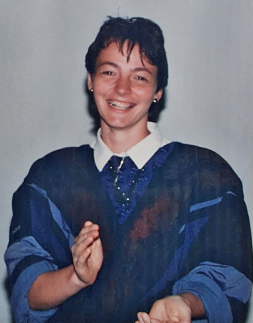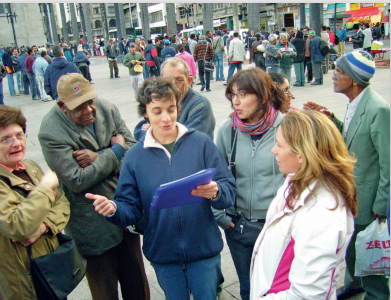A yes that changed a life: the story of Christiane, a Scalabrinian secular missionary

Christiane, Scalabriniana Secular Missionary
My name is Christiane, I am German and from Ingolstadt, a city near Munich. Years ago, I attended a formation day in the diocese of Rottenburg-Stuttgart. At that time, it was not common to meet people of other nationalities in those settings. Instead, that time among those present, one was not German: she was a Scalabrinian secular missionary. We got to know each other, and she invited me to an international youth meeting at the Scalabrinian Missionaries’ Spirituality Center in Stuttgart.
“Do you really love me?”: God’s invitation to a soul.
What remained with me from those days, and what fascinated me? First of all, the depth and communion in which we lived among people of such different languages and histories, I was left with the encounter with migrants living in the shadow of our beautiful cities: I opened my eyes to the poverty present in my country and, at the same time, to the generosity and capacity for sacrifice of those people, to their wealth. And on Easter night I discovered a God who is Father, Father of all, and who was asking me, “Do you really love me?” (cf. Jn. 21:15). But I was not ready to say yes, to leave everything and to trust Him totally. I felt His question burning inside, but I answered “no” and left for Israel. I had thrown myself into social life and was working with different leftist political groups. I had many commitments and a thousand dreams for the future. But I wanted to do something against the injustice that I saw present everywhere in the world. I was looking for authentic people and something that would give meaning to my life.
Today, with a retrospective look, I find that two bishops accompanied me in this search, even though I, as a good German, had little sympathy for bishops. The first is Blessed G.B. Scalabrini himself. The other is St. Oscar Romero, who died a martyr’s death in El Salvador. When I learned of his death, deep questions arose in me: how could someone give his life like that? Now I was presented with the opportunity of a year in Brazil, thanks to a twinning with a grassroots community in a favela in the Northeast. I left. Life and death, violence and hunger were daily events. Yet I was touching with my on hand a boundless hope, a simple and authentic faith. It was a year that marked me deeply and turned my life upside down: the year when I encountered Christ crucified and risen up close in the poor and in myself.

My encounter with Scalabrini
During my internship in Brazil, I also went to São Paulo. That day was indeed Dia do migrante (Migrant’s Day) and a procession of poor people and little ones walked with songs and signs between the most miserable buildings and skyscrapers of downtown. And who did I see walking with them? Some Scalabrinian Lay Missionaries. It had been seven years since the first meeting in Germany: I was not expecting this. I stayed three days with the missionaries and felt at home in that small apartment in the middle of the ghettos. The encounter with them touched me deeply, but after those three days I renewed my “no” and left for Foz do Iguaçu.
While visiting alone the church of São Miguel, who do I find in front of me? Scalabrini! His image on a big sign. Again I was not expecting it! I approached and said, “What do you want from me?” A little later the pastor showed up and, hearing that I was German, said, “I am a Scalabrinian missionary and I have a missionary brother in Germany, in Stuttgart!” I had not yet begun to get to know him and Scalabrini was already teasing me! Before returning to Europe, I went once again to São Paulo and stayed for two weeks with the missionaries to learn more about their lives and the Scalabrinian charism. What stayed with me from those days? The tireless passion for migrants, a passion that was expressed as a first welcome, but also as outreach to reach the nerve points of society, there where decisions are made, and as a “bridging” presence between rich and poor, between the migrants of the first hour and today’s undocumented.
Saying yes to Christ: the road to happiness
It was one of the last days in São Paulo and I was in the Cathedral for the commemorative Mass for the anniversary of Bishop Oscar Romero’s death. At the time of the offertory, I noticed that the elderly woman who was right in front of me, barefoot and dressed in rags, was going forward to bring her offering. And I asked myself,“And you, what do you give?” There I realized that God was asking more than my hands, my social commitment: he was asking me for everything so that he could give me everything, and I said yes, a “yes” that completely changed my plans. A few months later began for me the time of formation to prepare me for the Scalabrinian missionary life with the vows of poverty, chastity and obedience,celebrated in Piacenza in 1994.
One of the dimensions I received in those early years is precisely gratitude for the Scalabrinian missionaries through whom we missionaries came to know Scalabrini. And Scalabrini continued to tease me in my daily life. For example, during the years of my missionary posting to Rome, I found myself with the other missionaries looking for a new apartment, and when we found it, we discovered that from the kitchen there was access to a small veranda with a window overlooking the altar of the adjacent church. How could we not think of Scalabrini and his passion for the Eucharist, the hidden ferment of his entire life, his every intervention and his hope .



